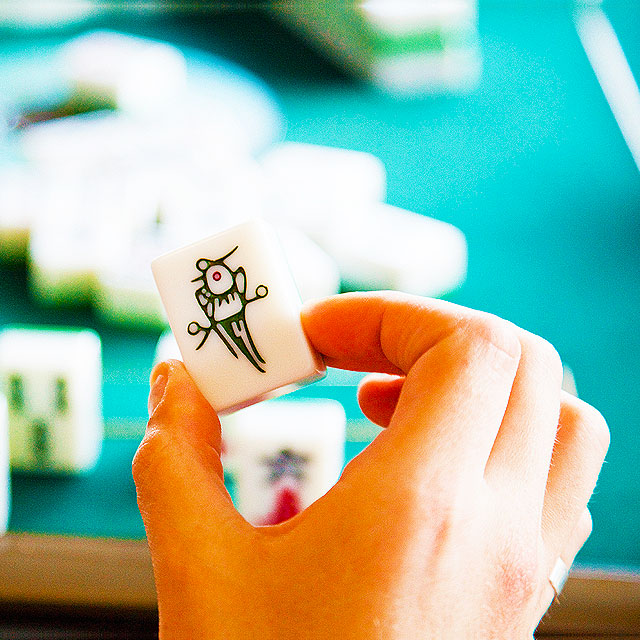域名 Majiang.net 正在出售中,如果您对该域名感兴趣,请点击这里提供您的报价。
The domain name Majiang.net maybe for sale. Please click here if you would like to make an offer.
Majiang History
There are two theories about the origin of Majiang. The first theory suggests that Confucius, the great Chinese philosopher, developed the game about 500 BC. The second theory implies that the game was developed from existing Chinese card and domino games sometime around 1850.
The following information supports the first theory:
Majiang emerged in various Chinese provinces at the time when Confucius was teaching his new doctrines.
The three dragon (Cardinal) tiles coincide with the three Cardinal virtues taught by Confucius. These are:
- Zhong

- Fa

- Bai

- Zhong
Confucius was said to be fond of birds, which would explain the name "Majiang", meaning hemp bird or hemp sparrow.
Terminologies used in Majiang like Pong, Chee and Kong. Confucius was of the Kong family his full name being Kong-Qiu, he married a girl named Che and adopted the term Chee meaning 'to connect' which Westerners corrupted into Chow.
On the other hand, the following information supports the second theory:
Some historians believe that Majiang was based on a card game called Mádìao (also known as Ma Tiae, meaning Hanging Horse; or Yèzí, meaning Leaf) in the early Ming dynasty.
This game was played with 40 paper cards similar in appearance to the cards used in the game Ya Pei. These forty cards, numbered 1 to 9 in four different suits along with four extra flower cards, are quite alike to the numbering of Majiang tiles today.
There is still a healthy debate about to whom the creation of the game should be attributed. One theory is that Chinese army officers serving during the Tai Ping Rebellion created the game to pass the time. Another theory is that a noble living in the Shanghai area created the game between 1870 and 1875. It is thought that around 1850 in the city of Ningpo two brothers had created Majiang from the earlier game of Mádìao.
In 1895, an American anthropologist named Stewart Culin wrote a paper in which Majiang was mentioned. This is the first known written account of Majiang in any language other than Chinese.
By 1910, there were written accounts about Majiang in many languages including French and Japanese. An important English read was Joseph Park Babcock's Rules of Mah-Jongg, which, simplified in 1920, was simply known as the "red book". Although this was the earliest version of Majiang that had been introduced to America, many of Babcock's simplifications are abandoned nowadays.
Majiang was a sensation in America when it was imported from China in the 1920s, with the same Majiang game taking on a number of trademarked names, such as Pong Chow or the Game of Thousand Intelligences. Part of Majiang nights in America were to decorate rooms in Chinese style and dress like Chinese. Several hit songs were also recorded during the Majiang fad, most notably Since Ma is Playing Majiang by Eddie Cantor.
American Majiang, which was mainly played by women during the time, grew from this craze, and in the 1930s, after many revisions of the rules (including some that were considered fundamentals in other variants, such as the notion of a standard hand) led to the formation of the National Majiangg League (NMJL) in 1937, along with the first American Majiang rulebook, Maajh: The American Version of the Ancient Chinese Game.
Despite it being Chinese in origin and accepted by players of all racial backgrounds when first introduced by Babcock, American Majiang is considered a Jewish game, as many American Majiang players are of Jewish descent, and the NMJL was founded by Jewish players and considered a Jewish organization.
But, at the same time, this traditional Chinese game was banned in its homeland in 1949, when the People's Republic of China was founded. The new Communist government forbade any gambling activities, which were regarded as symbols of capitalist corruption. After the Cultural Revolution, the game was revived, and once again Majiang has become one of the most favorite pastimes of the Chinese people.
Today, the popularity and demographic of players of Majiang varies from country to country. In America, most players of American Majiang are women. In Japan, there has been a much greater emphasis on gambling before other legal public gambling were devised and the gender of the players is much less divided. There are also many governing bodies of Majiang, many of them hosting exhibition games and tournaments. In Japan, video arcades have introduced Majiang arcade machines that can be connected to others over the internet, as well as video games that allow a victorious player to view pictures of women in varying stages of undress.
Majiang culture is still deeply ingrained in the Chinese community: Sam Hui wrote Cantopop songs, using Majiang as their themes. Chinese movies have always included scenes of Majiang games. Gambling movies have been filmed time and again in Hong Kong, and a recent sub-genre is the Majiang movie.
